November-December 2000
A Magic Moment In Marawi
By Fr. Rufus Halley mssc
Malabang Marawi
It was Sunday morning in late September. I don’t remember the date, but I’ll never forget the day. Joel was to be buried and the whole parish was in shock and in mourning. Here was a grand young fellow, of deep faith, who was gunned down on his way home for is lunch. Nobody would be picked up for the crime as perpetrator came from an influential Muslim family.
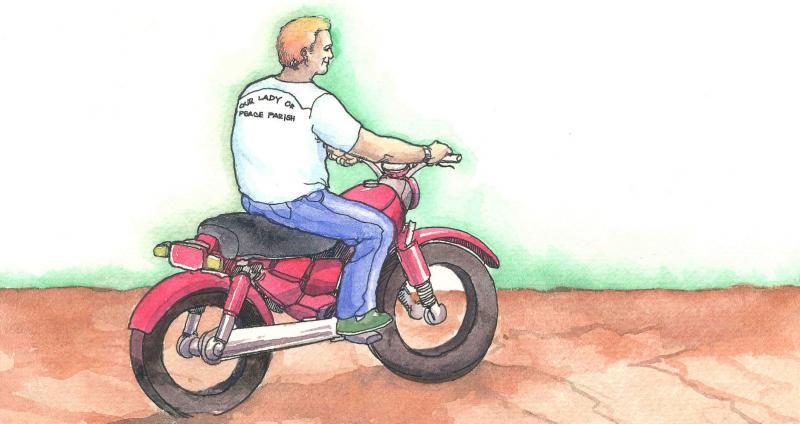
As I rode motorbike I thought how difficult this dialogue between Muslim and Christians was, at time like this you just have no stomach for it. A heaviness, a weariness comes down, almost incapacitating you. But I had made a promise to visit a family that day, a Muslim family who had a girl in our high school, and so I decided to keep going. The family was in bereavement in an unrelated incident, another child, a boy of only 17 years had been shot in an on-going blood feud between two Muslim clans. So, as the director of the school, I was on my way to offer condolences.
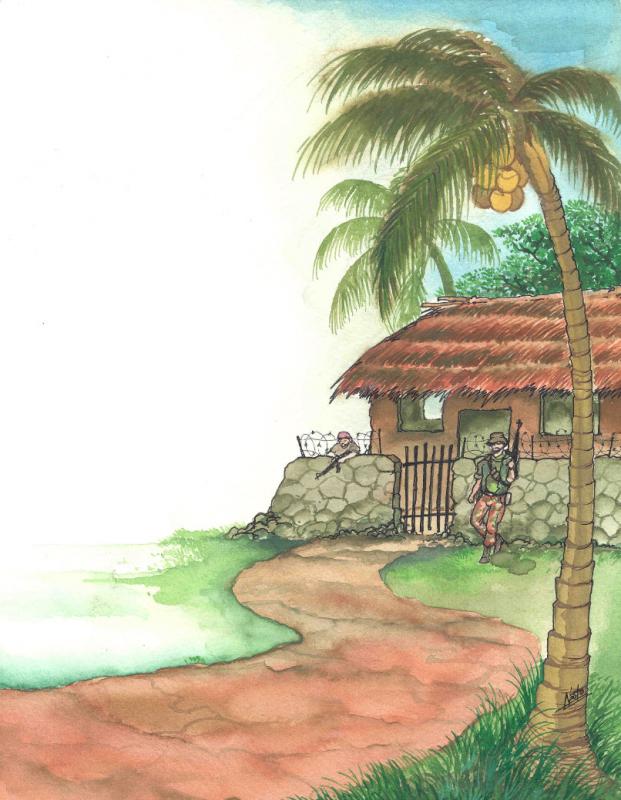
Ten-year Feud
Even though I did not know them personally they were most friendly and welcomed me warmly. One of the cousins lived in the first house on the way, and I put this question to him a little diffidently, “Can nothing be done to end this feud amongst you?” To which the reply came back, “Would you help us?” I was speechless. This was the first time I had even been asked- in eighteen years since coming to the Muslims area – to help out in this type of situation. I could not believe my ears .what an honor to be invited! But perhaps I’m in a way over my depth here. What if something goes wrong? Maybe my knowledge of Maranao is not up to scratch. At the same time what an opportunity to help. But if I get one word wrong the whole thing could unravel. Don’t forget, this feud has been going on ten years now, with nearly twenty people dead.
I was eyed for a middleman
Meanwhile I’m brought to other houses though beautiful rolling countryside studded with coconut trees. There are fox holes along the way, wire fences, and earth works thrown up around the houses just in case of an attack. They are just as welcoming here, and before I left, the men asked me again, “Would you help?” “What kind of help?” I countered, “That’s up to you,” they said. “All right,” says I, “I’ll go and visit the other side and see what can be done.” “The one you ask for is Commander Erning,” they suggested. “This is going to be tough one,” I thought. Yes. They were indeed looking for peace but were yet on a war footing, in battle fatigues, carrying every imaginable weapon. For sure there’s a lot of prayer needed here. I thought, a Muslim friend was a delighted as she was surprise at the news. “You know,” she said, “they could not ask another Muslim to do that. It might appear as weakness.”
Peacemaking Task
A few days after, I headed for the other family. I was stopped immediately by a young gun-toting fellow. “Why do you want to see Commander Erning?” “Oh, just a visit.” I ventured, “Alright, I’ll take you.” So, up he hops on e motorbike and off we go. There was a cluster of about eight houses. And there was Commander Erning-longhaired, with an authoritative air about him. The amenities were exchanged. Coffee was brought, and again I was struck by the friendliness of the people. “Ah, you’re the priest from the Our Lady of Peace School?” “Yes, that’s me,” I said. They were satisfied when I said it was just a social visit and so we started talking about their place, ad how fertile the land was- the trees bending under the weight of coconuts. They had many questions on hearing I also was a farmer in Ireland. After what I judged a suitable time, I broached the object of my visit. That I had been with the other side and they were interested in peace. “Would you be interested in peace?” I ventured. The mood changed perceptibly. There was stillness, and on my part, for sure, a tension. How would this be received? Having heard me out nobody said anything till Erning annunciated his position. “Father, all we’re asking for are the seven guns they owe us and payment of an outstanding debt. We’re prepared to settle for that. We are very grateful for your help.” “So, who would we get to negotiate this?” I queried. “We would like the Sultan of Borurao,” they said. “Alright, I’ll go and see him in the next few days,” I said. Sultan Quirino was the one who had negotiated the ceasefire of which there were still three weeks to run. Before seeing the Sultan I had to confirm the other side’s acceptance of the chief negotiator. I approached them, and happily, they agreed.
The Sultan was very surprised to see me especially when I told him what was afoot. “A thousand thanks, my brother, for helping us. You know both sides are related to me, and I’m already working on it. Tell them what you have just told me about how peace has now finally come to Northern Ireland. How they are tired of the killing and why they all want peace. I, with the Vice-Mayor of Matanog, will work on the negotiated settlement. You just keep speaking to them of the benefits of peace to try and lessen the bitterness.
No-win Fight
Meanwhile, as my role clarified I became very excited and saw for the first time the possibility of a settlement. Then followed, visit after visit to each side. What they were asking was not exorbitant. In fact there appeared a real chance of a lasting solution. “Who’s winning in this conflict?” I asked. Silence. They were honest enough to admit that everybody lost out. “Here you are, locked in to your area. If you go to Malabang, something might happen to you. Your boys cannot study in high school or college for the same reason. Yet we have there now a real chance for peace, which may not return again. Don’t just focus on the faults of the other side. We all have faults. Allah is with us. He wants us to live in peace. Don’t squander this opportunity.” Meanwhile, I asked a few sick people in the town who I visit on first Fridays for their help, their prayers. Their mission is very real even though they never though leave their beds that they offer up their sufferings for a negotiated settlement. Sara was the first I asked. “Yes Father, I’ll do that.” (Even though she was ambushed 22 years before by Muslims and I lying in bed paralyzed from the waist down ever since.)
There was a further 15-day extension to the ceasefire. The Sultan reported good progress. And I noticed in both sides a diminution of arms on display and fighting talk. Initially each side warned me to beware of the other. “Don’t trust them” was a recurring them. But now they were even prepared to admit some of their own failures.
The Peace Drama
Things were looking good. I kept up the visits. The ceasefire was extended for another four days. “We’re nearly there,” the Sultan tells me confidentially. “But don’t say anything yet.” After a further and final ceasefire extension of two days, both sides agreed to a singing of peace accord on Tuesday, November 17 in the Municipio. What a day! I’ll never forget it. On the way I noticed extra soldiers and police. Each side would be afraid of an ambush, so every precaution had to be taken. I had been in the Municipio for about one-and-a-half hours when the word went out: “They’re coming.” And sure enough, there was the cavalcade smoking along slowly but surely, led by an army jeep with six armed soldiers. Then followed a big truck carrying Igid and his cohorts. Finally, bringing up the rear was a big amphibian tank. In they came; not a word out of anyone. They smoked and smoked, very tense. We had to wait for an hours before finally the other side arrived. My goodness what an emotional moment. All packed into the hall, perhaps 150, and another hundred outside. Nobody looked at anybody else, but all were pale and tense. And then in a very emotional voice the Sultan voiced his hopes for the future, where peace would triumph and endure. The main leaders he brought out in front of a long table, behind which were seated the Mayor, Vice-Mayor of Matanog, two colonels and myself, and placed on top of the table was the Quran, covered with a Maranao woven cloth.
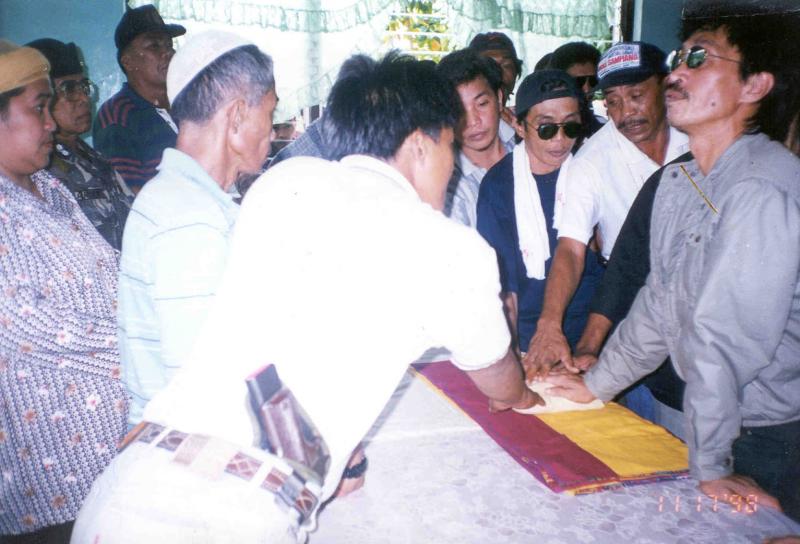
The Quran was unveiled. Erning and Igid’s hands were placed on it and with there respective followers swore to abide by the terms of agreement. Then both swore to abide by the terms of agreement. Then both were brought to embrace one another-a noble but alas, premature gesture. They could not even look at one another. But the papers nevertheless were signed, photos were taken, and speeches were made. What a wonderful day. It was such a privilege to be part of something so good:
In the next few days I visited each side and gave a sign I had gotten made for each which read, “Abode of War” – a line running diagonally across it crossing it out, as it were. On the other side, also in Arabic was written “Darussalam”, Abode of Peace.
Wonderful Sight

Igid was the second I visited with the sign and one of the fellows, Maitin, told me that the process of peace-making had already started. One of the leaders from the other side was, even as we spoke, visiting them. I was thrilled. This was the real music I wanted to hear. “Come on over and meet him,” he said. Well, I did not need a second invitation. Over we went through the marang and coconut threes, and sure enough, there were Palas, along with alang and Sultan Boribid sitting down and chatting at the side of the house. What a beautiful sight. Yes, this is what it’s all about. It was all very exciting. I think they must have thought I was little daft. We took a few photos, of course, and even coaxed a few of the wives to join in. normally, with a man not of the immediate family present, the women stay out of sight.
Finally, last Saturday at the Parents Day in the school, one of the fathers came up to tell me that he himself had been over to the other side for a cup of coffee. What more can I say? As the good Muslim says in all situations, Alham-dulillah – “All praise to God.” The peace accord was singed on Tuesday afternoon. Sara started getting quite sick on Tuesday, afternoon and died on Thursday morning. Her last assignment accomplished; her last request granted; she was taken home to rest by a grateful and gracious God.
Angels In The Land Of The Magnificat
By Sr. Norma More dc
Up to 1948 Ein-Kerem was a predominantly Arab village but in the war of Independence the Israeli army conquered the territory and the village is now a Jewish stronghold with many families here living sturdy, beautifully constructed homes. The place is famed as the birthplace of John the Baptist Benedictus prayer. Close-by at the foot of the hill is the “Virgin‘s Fountain”, the spring where Mary would have fetched water for the household and where she would have refreshed herself. Countless pilgrims visit every year, praying at the Church of the Visitation which marks the site where Mary visited her cousin and the child in Elizabeth’s womb leapt for joy and the words: “Blessed are you among women and blessed is the fruit of your womb” were spoken. Mary replied with the Magnificat and this prayer can also be seen on the walls surrounding the church in all the languages of the world even in Tagalog.
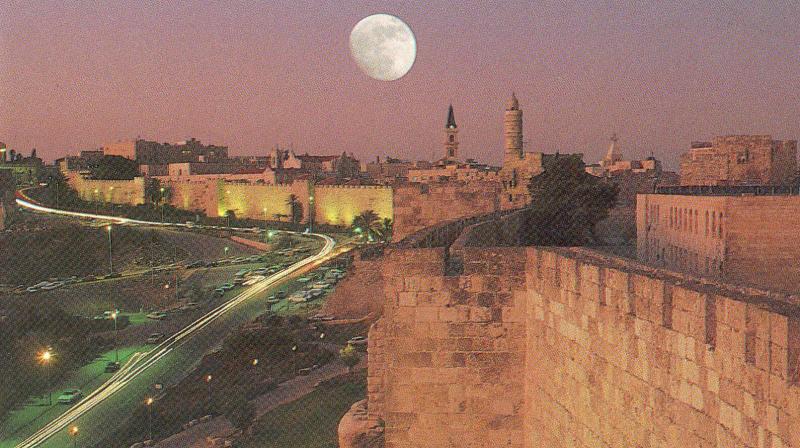
First Missile Attack
This is where our St. Vincent’s home for physically disabled children is located. I first arrived here in November 1991, barely two months before the Gulf War started and Saddam Hussein threatened Israel with missile attacks. I have a vivid memory of it because it was my first encounter with ‘star wars’. In January 17 of that year, we had the first missile attack. We were then living in sealed rooms because of the threat of chemical weapons. Although parents put pressure on volunteers to return home, the majority stayed to help despite real fear, and there was an atmosphere of service and heroism.
One Big Happy Family
In St. Vincent’s are 70 mentally and physically handicapped children raging from one year to fifteen years old. Some are visually impaired, some have convulsive seizure disorders, A few cannot walk, and some can only speak a few words.These children rely on others all the time for there needs, so there is round-the-clock care for them. Two Israelis, two Palestinians, and myself form a health team to ensure their physical well-being. The Jerusalem Municipality provided a school building, which is just besides our building, with specialized educators. The children are given the best possible physical amenities, medical, paramedical and educational therapies. Generally there is little hope of progress but I believe our enduring patience and tender loving care can bring about miracles.
In our community we experience unity in diversity: Sr. Catherine is Austrian, Sr. Selma and Aurora are Lebanese, Sr. Susan is American and myself, a Filipino. What is wonderful is that these children are the reason for Jews, Muslims and Christians to come together in St. Vincent’s and take care of them despite tensions in Israel resulting from political and racial disharmony. The employees fromm different religious can be friends here; they say, “At St. Vincent’s at least we can live in harmony like one family.”
Search for Meaning
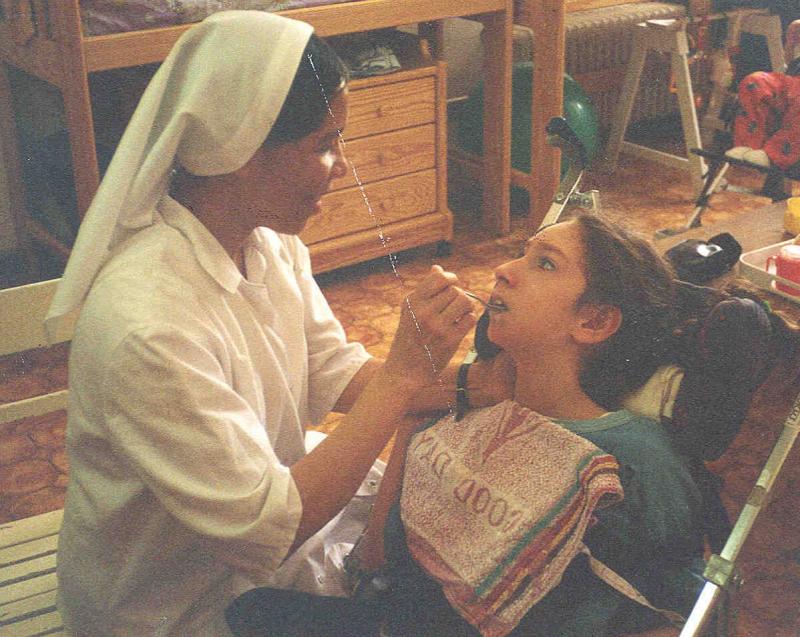
“Inventiveness to Infinity”, one of St. Vincent de Paul ‘s maxims, is our endeavor, particularly in seeking to improve the quality of life for our special children. Physiotherapy, music, art and visual stimulants, weekly outings and annual summer camps are arranged wit the help of fifteen volunteers. Almost all of the volunteers get attached to the children after some time. They give the best of themselves and that unselfish love, which is perfectly reciprocated by the children, gives meaning to their lives-the one thing which they probably have been looking for before coming to St. Vincent’s.
Evangelized in Mission
I myself have truly experienced Christ in their midst. They evangelized me. I learn fro them that God never abandons the afflicted ones, but always sends angels to care from them. We no longer experience missile attacks, no more sealed rooms and threats of chemical weapons, but just like any missionaries in the world, we undergo other difficulties. Sometimes we run out of food or funds for equipment maintenance, but suddenly someone would supply the need and we would see the loving providence of God at work. It can be physically and emotionally exhausting too at times but many of my fellow missionaries here say they receive even more that they give. This is not easy to understand; it really has to be experienced and here in this Holy Land, Where countless stories of Jesus', own persecution have been kept in the holy pages of the Bible, I have experienced it and this feeling remains with me for the rest of my life.
“I believe our enduring patience and tender loving care can bring about miracles.”
Father Joeker

By Fr Joseph Panabang SVD
JUST CALL ME MARY
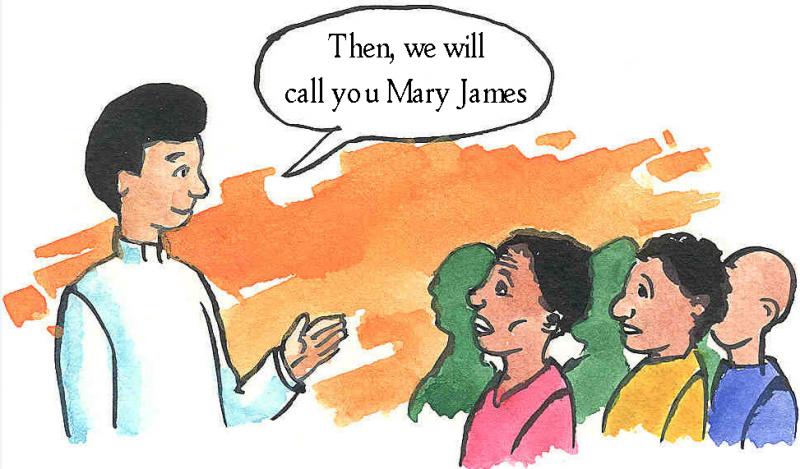
Among our catechumens in Kintampo was old man. Asked what Christian name he wants, he said, “Mary.” Very politely I explained that Mary is for women but he insisted he that he likes the name very much. His classmates smiled indulgently. And why not? What more beautiful than Mary’s name for a man who has no gender hang-ups.
EVANGELIZING BOLO
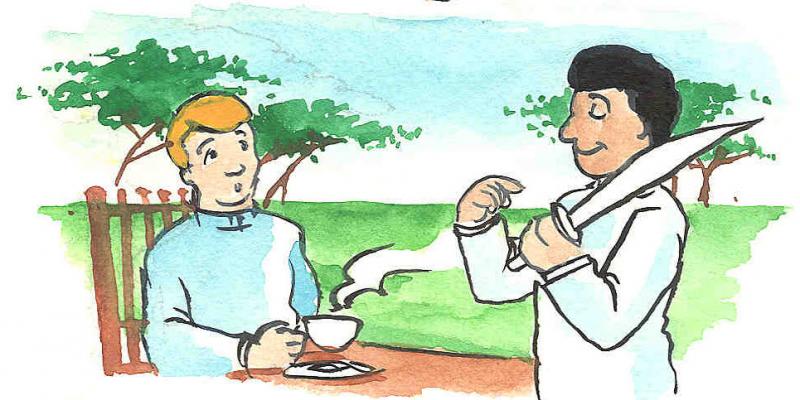
Fr. Tim Fred, SVD, stopped at Kintampo on his way to Accra, the capital of Ghana. While enjoying his coffee, I just entered from the garden with my bolo newly sharpened. Surprised he asked, “What’s that?” “This is the newest latest tool for evangelization. A good mason must have a good tool and so with a missionary,” I said with tinge of pride. A veteran missionary himself Tim gave a smile of satisfaction and a nod of approval.
BLESS ME FATHER
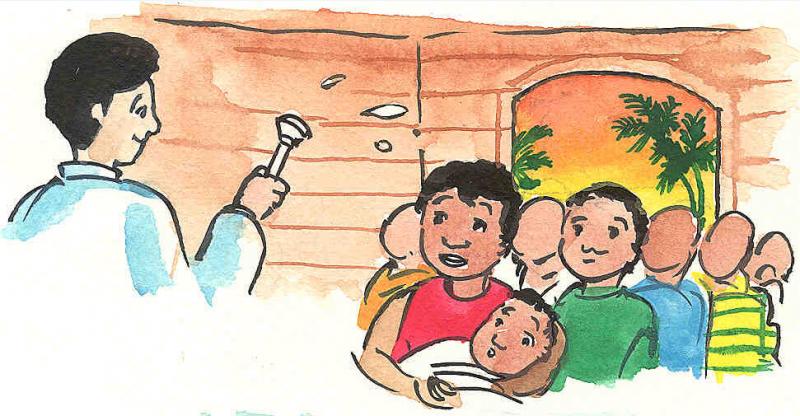
Almost all our faithful here believe that if you are not touched by the Holy water you are not blessed. Once during asperges, I was sprinkling the people when a mother pointed to her daughter who was sleeping that she is not yet “blessed”. Dipping in full the sprinkler into the water, I sprinkled the girl who woke up jumping completely shocked and frightened. Poor girl, I shouldn’t have shaken up the sprinkler too much.
FAMILY TREE
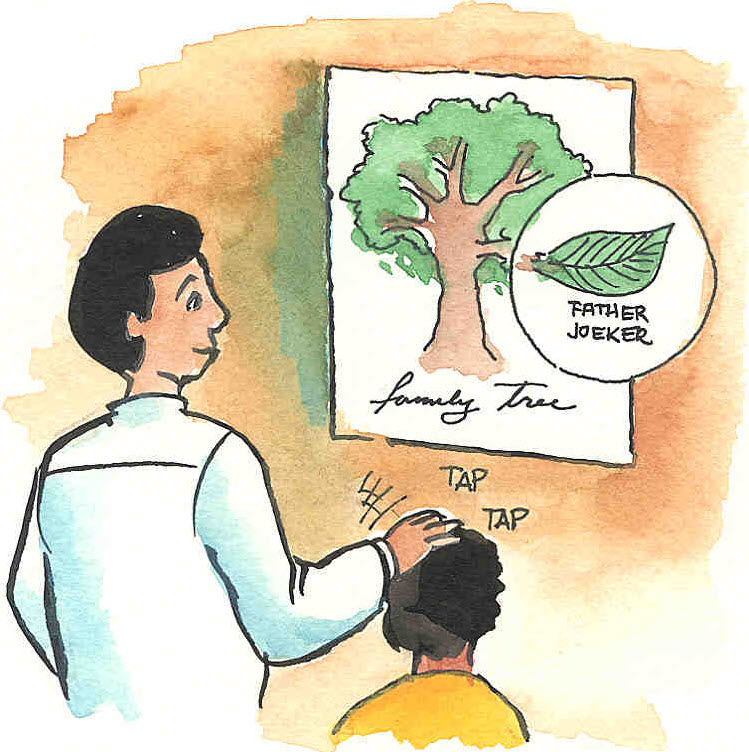
While on homeleave, I visited one of my brothers and nicely hanging on the wall of his house is the homework of his daughter about our family tree. It was beautifully done, I must say, starting from our great grandparents to the present. Under the names of my brothers and sisters are the names of their children. Coming to my name, of course nothing was written. Knowing how people I our culture ridicule those with no children, I called to his daughter who wrote the family tree and said firmly, “under my name, either you write Priest or remove the whole thing.” Else they might think I am “basig” (in Kalinga culture means – one who is unable to have children). She did write Rev. Father and even added: Ordained 24th October 1984; Assigned as: Missionary to Ghana, West Africa.
Follow Your Star
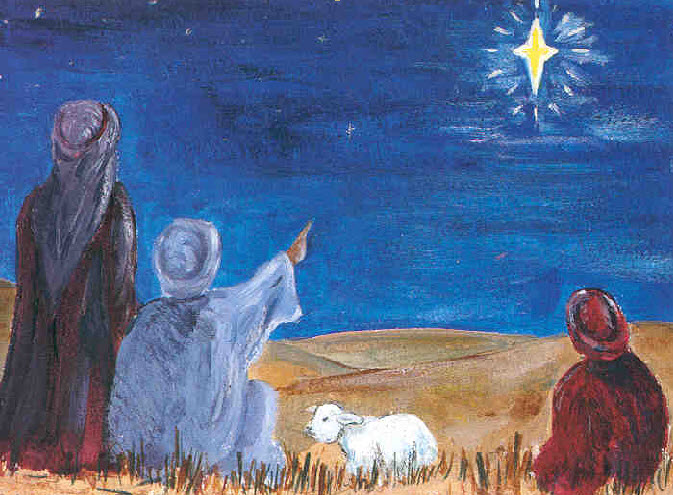
Gaspar and Baltazar
Into the life of every man
There flashes forth a star.
It shone in the eyes of a people
It stood in a nation’s ken
But the only fools that followed it
Were Three Wise Men.
And they rode with the hearts of children
Till to the walls they came
First of Christ’s crusaders
To the walls of Jerusalem.
And half-roused sleepers wondered
And the village dogs would bark
To hear the Wise Men’s caravan
Go blundering through the dark.
But never a doubt in Melchior in Gaspar or Baltazar
The ways were wild
But they heeded not
For their eyes were on the star.
And they went with their treasures of frankincense
They went with their myrrh and their gold
While over the feasts of their jesting kin
The mad thing was told.
Yet deeper they plunged in their folly
And heaven and earth seemed lost
But there marched unseen beside them
God’s flame-winged battle host.
And they found their peace and their healing
As they knelt in the stable bare
And a day would come when their kin in the East
Would curse that they were not there.
As into the skies of Melchior
Gaspar and Baltazar
Into the lives of you and me
There flashes a star.
- Paddy O’Connor, ssc
God’s Loving Touch
By Her Excellency, Mary McAleese, President of the Republic Ireland
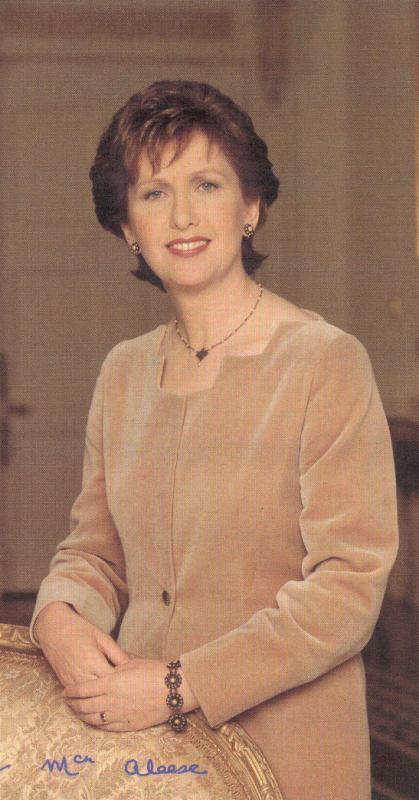
Mary McAleese is the president of Ireland. As a girl she helped to promote the Columban mission magazine, The Far East. Recently she was asked to address missionaries and here is an extract from her address.
Through the years I have come to know and hugely to admire the tremendous work done by missionaries in all parts of the world – the extraordinary heroism they have demonstrated in bringing and, more importantly, living the Gospel in so many different places. More than anyone, they have great insight, distilled from their experience, that what the world need s most of all is the loving touch of God, not empty recitations from some rule book. More than anyone, they’re well-placed to bring this message to a world still locked in conflict and prejudice.
A Shared Ethnic
Even the most unyielding problems can be resolved on the foundations of a common value system, built by men and women of good faith coming together with a common mission as equals and with a commitment to turn away from a conflict driven world view to a consensus driven one.
If such a value system is to have real effect across the world, it must be genuinely global. It must be transcend charges of ethnocentricity, in order to be accepted in the slums of South America and the villages of Africa. Given the diversity of cultures, values and social structures that exist across the world, it may seem that the challenge of formulating such a set of guidelines for human behavior that can be accepted universally is either impossible or would require an imposed homogenization.
In fact, neither is the case. The building blocks for such a common ethnic already exist within the religions of the world. Within our diversity, there is a common essence among all the great religions. An essence which has at its heart of Golden Rule that “we must treat others as we would wish them to treat us.” That basic premise, which is so familiar and yet so astonishing in its simplicity and power, is capable of being the source of a truly global ethic. There are few places on earth where these religions have not profoundly influenced – and continue to influence – the development of local value systems, local cultures. By coming together, they could play an invaluable role in promoting acceptance of this universal ethic within every culture and creed.
It sounds so simple. We may ask, then, why it has not already succeeded in changing the world. Perhaps, as G.K. Chesterton said of Christianity, “It is not that it has been tried and found wanting, it has been found difficult and left untried.
The God Difference
This is not a call of uniformity or religion, for attempting to deny or eradicate the kaleidoscope of differences in doctrine and form, practice and prayer that. God is, after all, the source of all diversity, the creator of e ach person as a unique human being. Those very differences between people. Between religions, provide us with the most profound evidence of the scale of God’s embrace of diversity. But it is nevertheless a call to action, to build bridges of trust between the different religions, particularly between the different Christians Churches, that can provide cause ways of trust to tier faiths. It is an invitation to listen and learn from each other, to identify the core values and objective that unite us, and to call to teach the next generation respect, real respect for difference take from them and to bury the old batons of contempt.
It is often those at the margins, who are most willing to take the necessary risks. They have risk to lose form upturning the comfort of established relations, the polite but empty exchanges that that have so often marked inter-faith dialogue in the past. They are closest to those in greatest need of our help – those whose lives are torn apart by conflict, poverty, injustice and despair, those whom we label as the marginalized, the socially excluded. Their insight and wisdom are needed in the world. Their giftedness is needed.
Known and Loved
You cannot divide love. Its nature is to multiply, to embrace openly and widely, to draw in, not to exclude, to make each feel part of the groups, to make ach feel completely at home, to reconcile. Exclusively is not in the nature of God. He made each one of us, called us by our name, knew us before we were born, has the very hairs on each head counted. God has no favorites. Captor and captive are his cherished children. Calvary is his gift to all. The Resurrection is his promise. The Second Coming is his invitation. It is an invitation to experience is loving presence, to share it and to bring the world out of chaos into reconciliation with Him.
That is the task – the missionary task for the third millennium – simple and only elusive if we let it be.
“More than anyone, missionaries have great insight, distilled from their experience, that what the world needs most of all is the loving touch of God...”
Salamat sa World Mission
His Christmas Wish
A couple of years ago the picture below appeared in the Philippine Daily Inquirer and the story of an extraordinary little boy who in spite of having only one leg has became a great surfer. We covered his picture in our June-July 1999 issue.
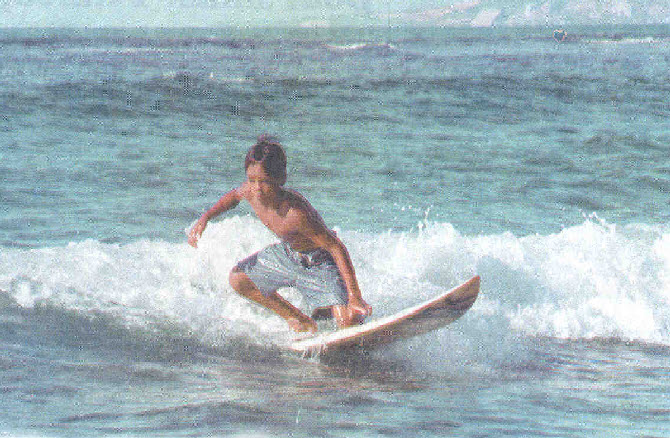
SAN JUAN, La Union – more than a year after the story of one-legged surfer Ronnie Esquivel broke through the front page of the Inquirer, few things have changed in the boy’s life. The 15-year-old still lives in a 4X5-meter hut by the beach with his parents and four siblings, and uses every chance he could snatch between school and feeding chickens to do what he loves best — surfing.
High School Scholarship
His simple life has been spiced up only by occasional visits from media people who almost always asked him, much to his delight, the same questions that made him take a plunge into the waves for a good shot. Despite his media exposure, Ronnie has remained laconic and shy but always eager to share his story without expecting anything in return. Perhaps the best thing that happened to Ronnie since he gained public attention was when he received a full high school scholarship from San Juan Mayor Anturo Valdriz.
Addiction
For sometime now, he has been a full-fledged high school student with a passable academic performance at the La Union National High School in San Fernando City. Although he should be in school from 7am to 4pm, a few times, good waves would seem to beckon him and he could not help but cut classes, his mother Thelma said.
“Isa ka talagang kutong dagat,” she would tell the boy but quickly added that surfing was better than any other form of “addiction” that most youths are susceptible to these days. Thus, she has been reluctant to curb the boy’s passion.
Gifts from tourist-friends
Perhaps another good thing that happened is that Ronnie now has two surf boards, the latest being a brand new all-fiberglass short board gifted him recently by Australian surfing enthusiast Carl Schafer. Another tourist-friend has promised to bring him another board by yearend as a gift. It is not unusual for tourists billeted at nearby resorts to take a fancy on Ronnie and sometimes hand him some cash or treat him to meals. Such forms of encouragement from friends have not come to naught.
New maneuvers
Frequent practice plus a much brawnier adolescent body have also made Ronnie a better board rider. According to him, he can now do maneuvers, such as the 360-degree turn, the cutback and the reentry floater. With these new moves, he now looks forward to joining the national surfing competition on Jan. 2 in his hometown.
At Christmas, the Exquivel family had lechon manok and pancit shared by 10 people, including a daughter-in-law and a grandchild. And on New Year’s Eve, perhaps a fare a bit more grand, if Thelma’ husband Rogelio, a utility worker of the Department of Public Works and highways, would receive his bonuses. “Siguro barbecue na lang; basta walang manok,” she quipped. She explained that her hardships in the past years seemed to have been caused by a practice of serving chicken, believed to make good luck take flight, on New Year’s Eve.
But when she did not serve chicken last year, things seemed to have become better for her family, she said. “Kahit ganito kami ngayon, kahit papaano, may nai-uulam kami sa kanin. Dati, minsan wala talaga,” she recalled.
Christmas Wish
What is Ronnie’s Christmas wish? This writer waited for his answer as his mother stoked the fire in the wood-burning makeshift stove under a pot of rice. He was too shy to say and averted from my gaze by looking under the table. One could admire Ronnie for a lot of things. But I admired him because he was not one who considered himself disabled and different and was not one who would ask for help. Perhaps, had he not looked under the table, I would have forgotten that he had only one leg. Surely, he would be the last person to call himself a one-legged surfer. He surfs with passion and plays basketball and his latest injury is a scrape which he got while skateboarding another hobby he recently took up.
Artificial Leg
He has defied all the odds. He seems content to have the sea, his boards, his family, his friends and his school. But his mother said he has a hard time lugging his surfboard or his schoolbooks while holding on to his crutch. The first time he was interviewed by inquirer reporter, Jerry Esplanada, Ronnie said he was told that a foreign benefactor had promised, if not already donated, an artificial leg for him. Unfortunately on Esplanada’s return trip, Ronnie was not home to learn what had become of this promise. And there has been no more talk about his artificial leg since. Without his saying it, we already know what Ronnie’s Christmas wish is.
Miracle For Donnie Ending
By Donnie Lama
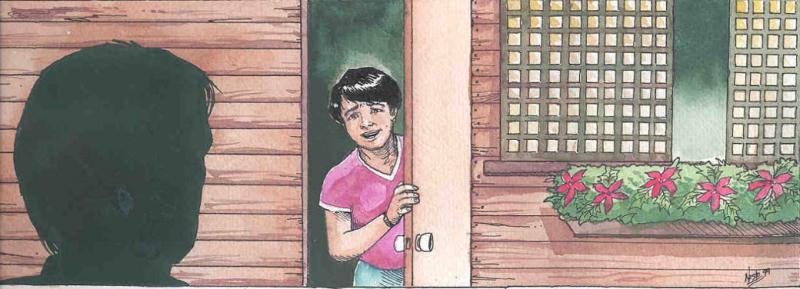
Before I received the 70 lashes, I prayed to the Lord to bear the pain physically. I must also remember His word from I Peter: 12-14 “Do not be surprised, my dear friends, at the fiery test that is coming upon you. As if you are experiencing something unheard of. Be glad that you are sharing to some degree the suffering of Christ, in order that in the revealing of His Glory you may be full of joy. Happy are you if you are insulted because you are Christ’s followers; this means that the glorious Spirit, the Spirit of God, is resting on you”
It was a terrible physical pain as I was whipped with a cane which had a heavy lead attached at the tip of it. Each lash was as strong as the last one. Each one carefully counted, seventy in all, no more, no less. They fell on my back. Some fell on my thigh, I would fall when the whip reached my feet. But the guard would raise me up again and continue the whipping. I was amazed to find myself still alive even after the seventieth lash given because the prison doctor had read my blood pressure at 150/100 right before I entered the whipping area. With some “smuggled” antibiotics and skin medication, healing of my ruptured skin took shorter than normal. I was up and about after three days.
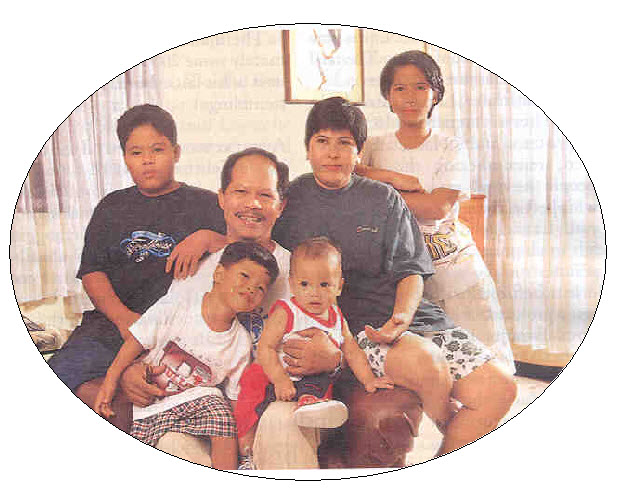
The following day, very early morning, the officer on duty called me. My employer was outside. He had brought my plane ticket which would bring me home to the Philippines.They sadly informed me, however, that the company could not provide anything more. I was not entitled to any company benefit. I understood the situation. I was just too happy to go home.
At 6 am the following day, I bid farewell to my friends who were very close to me (Ruel Janda, Rene Camahort) in prison. That was March 23, 1997. I was brought to the Deportation Department for five more days before I was able to finally to the King Khaled International Airport. I was a free man again.
Kindness at Flight SV 864
I boarded Saudia Flight 864 on March 28, 1997. I was bound for home. As I took my assigned seat, I suddenly experienced difficulty in breathing. I was having high-blood pressure. I was shivering. I called the stewardess immediately and asked for water.The stewardess immediately gave me water and called a doctor. The doctor gave me an Electro-Cardio Graph test. My blood pressure was read at 170 over 120. All the while, my mind was alert and knew everything that was going on. My doctor was already giving me instructions for me to be brought out of the plane on wheelchair. “I could not. Doctor you can’t! I explained my situation and what would happen if I were bought down for the plane. I would be returned straight to Malaz Jail! The doctor understood and talked to the Flight Captain. The Captain himself understood and did the next best thing so they could already proceed with the flight, which was already delayed by more than one hour. He looked for a nurse on board who could monitor my condition during the night. There was one who volunteered. Both the nurse and I were transferred to the Business Section of the plane. I ended up traveling first class!
In the plane, it turned out that many passengers recognized me and knew of the situation I went through. Many sympathizers to the injustice I suffered. Many waited to go near me just to ask how I was. They were, however, advised by the flight attendants not to since I was not feeling well. I was told of this later. The stewardess asked me who was fetching me from the airport. I said no one because nobody knew I was even coming home that day. The stewardess offered to bring me home straight to my house, as her father was fetching her. She happened to live in a nearby town where I lived.
I was about to get off the plane upon its landing at the Manila International Airport I was approached by the stewardess who handed me an envelope. It contained money – contributions from the crew and passenger for me. They just wanted to give. I could only thank them for their love and kindness.
That very moment I felt that the sufferings I experienced in Saudi was being replaced a hundredfold with so much warmth and kindheartedness from His own people. And it was only my first day. I was indeed home.
The Day before Easter
I reached our hometown in Dasmarinas, Cavite, a province south of Manila, on March 29, 1997. My wife cried as she saw me approaching our house. It was Black Saturday. But not for me. To me, it was already Easter, the day when Jesus resurrected and rendered powerless the gates of hell. To me, it was a day of celebration for my won victory over death. Everyone of my family was at home. It was an emotional reunion. There was rejoicing in our household. I knew in my heart that it was going to be the first day of the rest of my life. And I am living it for Jesus.
Miracle For Donnie Part IV
By Donnie Lama
Donnie Lama continues the story of his Saudi ordeal where he was imprisoned and tortured because in private he led a liturgical service for his fellow Christians. Part three in this issue tells of his final, almost miraculous, release. Read on...
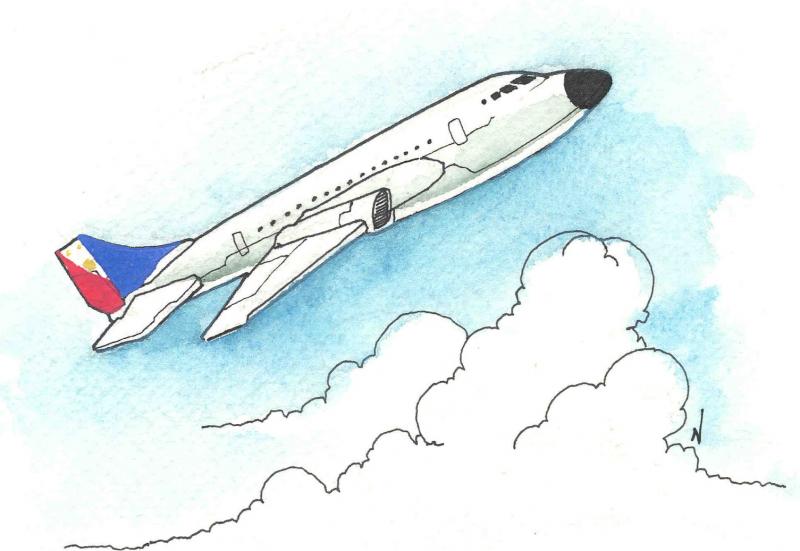
The Long Wait to Freedom
It was already November 16, 1996, more than a year after my imprisonment. The court summoned me again. Their first question to me was: “Have you now become a Muslim?” With my new found courage, I answered, “I am not a Muslim. I will never be a Muslim.” It angered the judge. “You are bad!” he said. I was rejoicing to be counted for Jesus. In my heart I was saying that whatever happens, I will stand up for my Christian faith. I had been imprisoned for being a Christian. My imprisonment will not be in vain. The judge pressed on, “Where is your license for being a priest?” as I had declared over and over again, I replied, “I am not a priest.” Then the judge said, “Okay, we will still study your case.” Meanwhile my friend Dermot O’ Niel, who works with my previous employer and who was also a brother in the Lord, had already learned of my plight at his time, started appealing my case through the American Embassy with support from the Canadian Embassy with the Ministry of Interiors. But still, it was not for another month that some progress came for my case.
The Sentence
December 16, 1996, I appeared in court again. The judge asked me, “Are you a Christian?” I replied, “Yes.” The court sentenced me to serve prison for one and a half years with 70 lashes. Upon hearing the sentence, I did not know whether to cry in agony or to cry in joy. I was sad that I had to serve this relatively long and heavy sentence compared to the sentence of three to six months received by other ‘religious’ who were convicted of the same crime. But I was also happy that at last the court had set a limit to my imprisonment. I only had to serve for four more months. “Do you wish to appeal?” the judge asked. “No.” I said firmly.
And so I waited. I was hoping that I would be included among those who would receive pardon from the King, which he normally gives during the Ramadan, which is a 40-day fast being observed by the entire Kingdom. The Ramadan came and went the following month. There was no pardon for me. I accepted that I had to complete my term.
Letters that Sustained Me
It was at this time that I received letters from all over the world. Unknown to me, my case came to be known by the Open Doors Netherlands through another Dutch organization, which published my name as among those languishing in jail without just cause. Open Doors Netherlands put me in the roster of Christian prisoners for correspondence by their supporters for encouragement. Some 200 letters came to me in prison. I would receive them opened and screened by the Saudi jail officer. I did not mind receiving them opened. The words of encouragement would still reach me whole. In fact, I was amazed that they even came through at all despite the screening. There were cards and letters with Christian messages, Christian images, Bible verses. It was like fresh rain in the desert land of Saudi and an oasis in the drier, parched land inside prison walls .the verses, which were written on cards, I used for my exhortations. I myself had carefully read each card and letter. I even took note of the designs and found meaning in every single illustration. I filled up my lonely nights answering some of them. I sent them either through Filipino prisoners who were going home or smuggled them out through my visitors.
70 Lashes
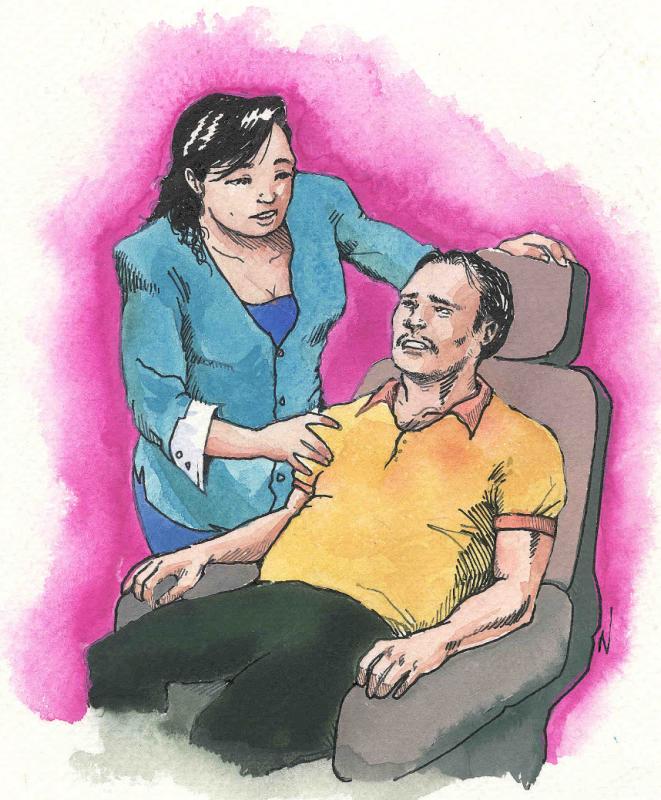
Exactly one month before my supposed release, however, the court ordered me to return to the police station where I was first arrested to secure clearance and claim the things that were confiscated from me. I also needed to secure my plane ticket from my employer before I could return to Malaz Jail for final release. It also meant receiving the second part of my sentence, which was the seventy lashes. It was February 2, 1997, wearing a T-shirt and jogging pants, I came toward the solid, circular wall and braced myself for the seventy lashes...
Small Houses, Big Heart
By Maria Nariva, a Fijian lay missionary in the Philippines
I arrived in the Philippines in October 1996. Coming from a small country like Fiji, everything is kind of a shock for me to see. Apart from that I was surprised to see the number of people at the airport and along the streets as we made our way to the Lay Mission House in Cubao. I asked myself, “I wonder what the population of this country is?” I was not only shocked at the number of people, but also at the pollution and the heat.
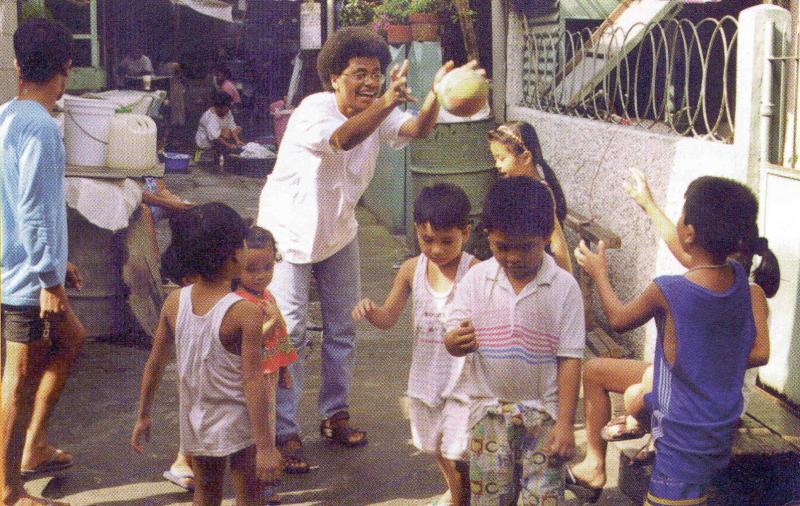
Attending the language school and learning the local school and learning the local language was another big and challenging part. Spending six months in language school with a month of exposure was very helpful before I was assigned to a parish.
My Assignment
I was assignment to Malate Parish, one of our Columban parishes in the heart of Manila. This parish also encompasses two congested squatter area. The population of the parish is about 20, 000 and almost these two areas.
I was assigned mainly to one of these areas named Dakota, known as “Area 8” in the parish. It has a population of about 800 families with an average of 6 in a family. I started off by doing visitation from house to house, mainly to practice my Tagalog and to get know the people. For a dark-skinned person with curly hair to walk around among these fair-skinned people was quite hard for me, and they called me American. But because of their warm-heartedness and with the Tagalog I know, it helped me get through slowly.
After a few months I was asked to help the staff to start a BEC, or Basic Ecclesial Community, and to form Bible Study groups in the area. Apart from that I also developed a special relationship with the children in the area. I found this very helpful in finding a way through to the parents. All the children in the area call me Ate Maria. (Ate means big sister.) Whenever the children call me form a distance it really makes me feel that I am one of hem and belong to them and to the community.
Looking at these beautiful children everyday assures me that God is alive and there is life. They have also been a source of energy to me and a source of inspiration. Thank God for the gift of life.
So, after completing a term and much time on one community a, it hurts me when I think of having to leave in a few months time. These are the people that have been my father, mother, brothers and sister for three years. Their kindness and generosity touch me. I don’t know how I will be able to say goodbye. My heart aches when I think about it. The voices, laughter and the way children call me everyday is music to my ears.
The people in the area live in small houses. Some houses have two or three families living together. Some take turns sleeping in the house because it cannot accommodate them all if everybody tries to get in at one time. Mainly the men will spend most of their time outside.
Mass in the Alley
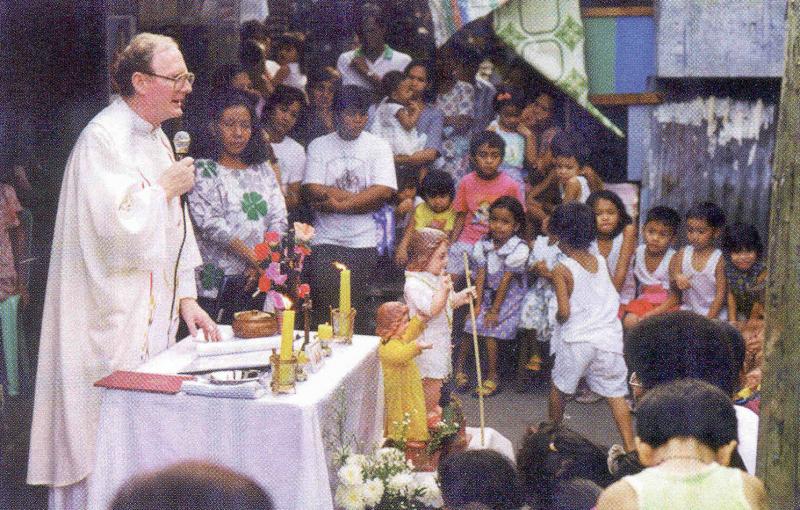
Even though they stay in small houses and congested areas, they still have faith. Every house I visited had a statue of Mama Mary and a statue of Santo Niño, the Holy Family. Every third Wednesday of the month we would have our area Masses. And because there’s no chapel in the area we just celebrated the Mass in the alley. The people in the different puroks prepare the place if the Mass in at their own purok. And they usually get excited and enjoy it.
The people in Area 8 have been great source of inspiration to me, their strong faith and how they live their life. Living in very small houses wit so many people in it doesn’t stop them form inviting and welcoming me into their home for meals and merienda. They stay in small houses but they have big hearts.
My experience with the people here in the Philippines have helped me grow and now I am ready to go home with many things I can share with my local church. And for all the people who have been a great help and a great source of inspiration to me during my three years on mission here in the Philippines, I can only say,
Thank you very much!
Make a difference! Join our lay mission program.
The Awakening
By Fr. Abe Sumalinog mssc
A lot of people ask me a serious question: Was becoming a priest your dream since childhood? Since I got used to answering question, I would not meditate too long but answer them simply, “No”.

I was born in a city but then my family moved down to a rural area close to where my grandfather lived. Our house is just right across the road where our kapilya is. It means that I have no excuse in not attending the community prayer or the Mass. Every month of May I was always present attending the catechism classes at the kapilya. It was those tickets (which at the end of the months will be changed with candies and biscuits) that kept me going there. I also remember that flowers are a big thing in May. I always made sure that I had the most beautiful and most fragrant flowers-picked from school or our neighbor’s garden-offered to the Blessed Mother. At home we used to pray the rosary. And my grandmother taught us to pray and bid good night to our Mom and Dad in Spanish which I did not understand.
The Awakening
It was in high school when I started thinking about priesthood. But that way of living was the least or not even on the list of my dreams. As a child I wished to become somebody who works in a big company, with a high salary, a beautiful house with a garden and a family. But as I grew up I realized that my dream and it was not really what I wanted to do in life. I wanted something more.
Idealisms of Priesthood
So thinking about priesthood as a young man I had loads of idealism and fantasies like I wanted to bring people back to God, converting the unbelievers and baptizing them in the name of Jesus. And I even had fantasies of healing the sick,physically disabled and driving out evil spirits using Jesus’ healing power. It was a good vision because through it, I found some purpose and aim in life. These idealisms were the stars that brought me to where I am and that made me what I am now and will be in the future.
Looking for signs
While mediating and praying about priesthood I remember that I spent a lot of time looking for signs that God was really calling me. I am sure that I never heard God calling me through a voice. But I tried recalling my childhood and tried to see how God touched my life. I was not very prayerful then but I prayed spontaneously from the heart like most children do. But I knew that whoever that man up there was I really was respectful and thankful to Him.
What’s in the Name?
As I kept on seriously searching and listening to God, I remember one time I asked my mother where she got my name. She answered me that my father got it from the Bible. She did not know why I asked her that question since I never told anybody about what was happening to me then. My two bothers and four sisters were named after the saints, not from the Bible. So I started praying and meditating about the biblical Abraham. Since then I began to know him more and more. I knew that my name is the same as in the Bible because I can recall a song we learned in catechism classes called Fr. Abraham. I sometimes got annoyed with other kids teasing me by that song in which one line goes like this “Father Abraham has seven children, some are black, the others are white...” (In Korea the Catholics celebrate their Christian name's feast day. I find this very meaningful.)
Gospel invitation
One thing that I found really helpful in my search is the Gospel. Jesus always invites people to work with him by basically living the gospel values. When I decided to join the priesthood I actually made a crucial decision: to be diocesan priest or a missionary priest. I decided to become a missionary priest. It was always the image of the disciples being commissioned by Jesus to go and preach the Gospel which gave me the spirit to choose this way of living.
Why Mission is a necessity?
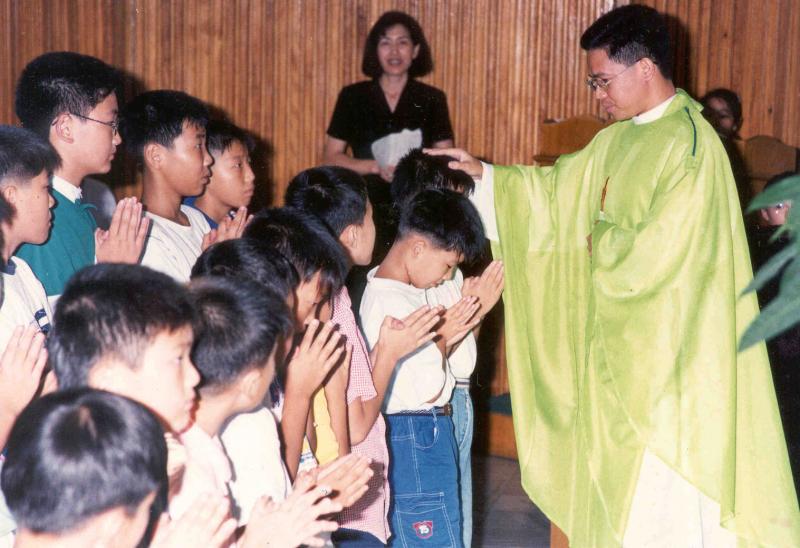
The things I have just written above were my thoughts when I was sixteen years old. Now that I am thirty-one I realize that I am here in a foreign land not to convert the pagans and baptize the unbelievers. But I am here to give witness to God’s presence in a place where God was before I came. As a Filipino I can always make a difference because the God I know through my people, experiences and culture is different from that of others. it simply means that through missionaries everyone receives a deeper understanding and experience of the one God that we all worship in hundreds of ways. The exchange of one’s experience of God will always be vital in a Christian faith if we are to understand God more deeply and serve him more seriously-through people and the whole of God’s creation.
The First Belen
By Fr. Niall O’ Brien mssc

Christmas belens – big and small –will appear everywhere to remind us in a simple way of birth of Jesus. The first to introduce this devotion was none other than Francis of Assisi whose story we tell below.
Town of Assisi
The little hill town of Assisi is one of the most beautiful places in the world. It is a tourist destination but it’s always a special tourist who goes there. One who is at least half on pilgrimage because they are going to see the birth places of St. Francis and St. Clare. Not only the birth places but he places also where they lived their extraordinary lives, worked their miracles and died their holy deaths.His biggest fear
St. Francis was born in Assisi in 1182. As a young man Francis wanted to become a knight in shining armor. He joined the battle between Assisi and Perugia only to be captured, ransomed back and get seriously sick. That illness was the beginning off a change in Francis’ life. Francis now turned towards God. One thing that Francis feared most of all was lepers. Whenever he saw a person with leprosy he kept his distance. Now that his heart was turning towards God he knew there was something wrong in the way he avoided them. So one day, as he was coming along the road he saw a leper. His first reaction was panic. But overcoming his panic, he walked up to the man and subduing his revulsion he embraced him and even kissed him. Francis looked into the leper’s eyes and said, “Peace and good.” And the leper replied, “Peace and good.” And that moment was a special moment in Francis’ journey towards God.
“Rebuild my Church”
Francis used to pray in a lonely quiet church called San Damiano outside Assisi. It was broken down and guarded by a priest who lived in a shack nearby. Francis loved the quietness and there he used to pray in front of a crucifix which hung over the altar. One day the figure on the crucifix spoke to him. Francis heard the voice saying, “As you can see, my church is in ruins. I want you to rebuild my church.” Francis took the message literally and began, in his own way, to rebuild the church. This got him into trouble with his father because he used the bales of cloth for his father’s warehouse. The result was a dramatic showdown between Francis and his father. His father felt that Francis was going mad, going around like a beggar collecting stones to rebuild old churches. Francis’s father felt he was letting down the family, most of all he was angry over him taking the bales of cloth. Francis father had him arraigned before the bishop and accused him of theft. That was dramatic encounter at which Francis took offal his clothes and handed them back to his father. He renounced his inheritance forever. The bishop’s gardener threw an old cloak over Francis. Francis drew a cross on it and walked away. With his inheritance gone, his ties broken, he was now free to serve God.
Peasant Garment
Francis restored many old churches but one day, after hearing the Gospel, he realized that what he was called to restore was the Church of God. At this time the Church was in a terrible state of decline, the result of the most scandalous excesses, luxurious living, and all sorts of misconduct practiced openly even among the high-ranking prelates of the Church. Francis decided that the way to answer the call of God was to live a life serving the poor, in joy and simplicity. Soon many followers gathered around him - the Brothers of St. Francis – they adopted a simple rough peasant garment with a rope instead of a belt as a girdle.
Brother Sun, Sister Moon

Francis had his own special spirituality, sometimes summed up in that picture of Francis preaching to the birds. Because he regarded all created things as related to him. You may recall the name of the famous movie Brother Sun, Sister Moon, the moon as his sister. He speaks with great respect for all creation. He sees God in everything. No wonder Pope John Paul II made him the patron saint of ecology and therefore of creation spirituality. One of the special moments in Francis’ life of course was the famous of course was the famous stigmata. Francis was the fist of a long line of saints to receive the wounds of Christ in his body. In September 14, 1224, something remarkable happened to Francis. Christ appeared to Francis in the sky and suddenly the wounds in Christ’s hands and feet and side of Francis. Francis felt the pain that Christ but also felt the love of Christ felt for us.
In His steps
Francis’ health declined and in the summer of 1226 he was moved to Assisi. The doctor told him he would die at the beginning of October. Francis said, “Welcome, Sister Death.” He asked his lesser brothers to sing the Canticle of the Sun, the poem he himself had written he asked to be laid on the ground and as he felt death coming on he said, “Sister Death, I welcome you for it is you who are going to introduce me to eternal life.” His brothers sang Psalms 41 and he died. Today thousands of is followers all over the world struggle to imitate him and through him, to imitate Jesus Christ by their service of the poor.
Viva Bolivia
By Sr. Socorro Gumnad, mic
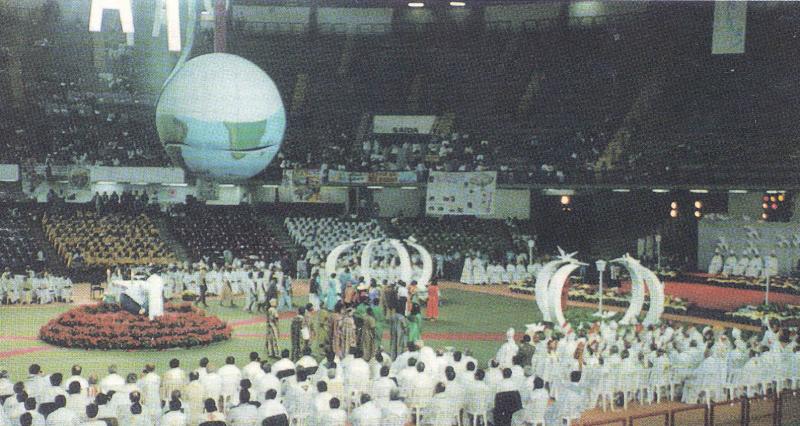
Filipino Sister Socorro Gumnad, mic is a happy to accompany a delegation of 90 Bolivians to a huge mission congress in Brazil. This congress took place in Belo Horizonte. In the photos we learn about the congress and how it helped to animate and encourage mission awareness especially the Basic Christian Communities. Two thousands seven hundred delegates from 41 countries gathered to discuss the role of Latin America in the missionary activity of our Church.
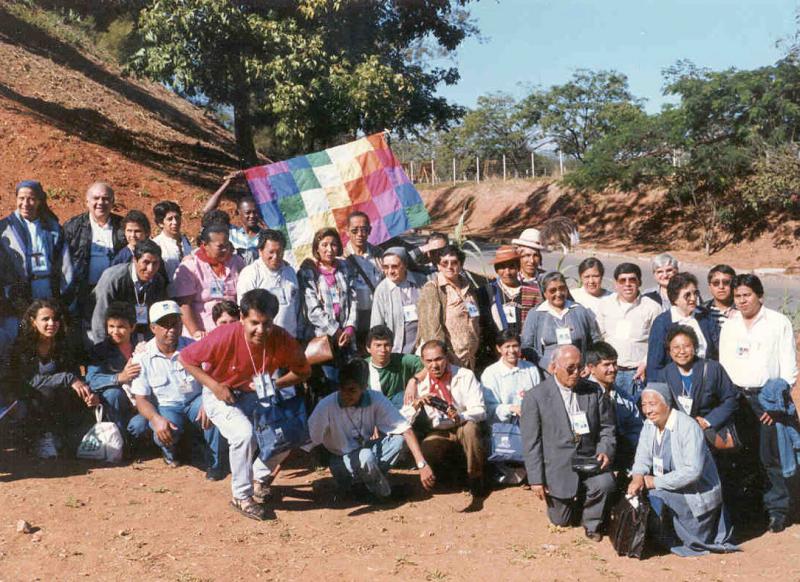
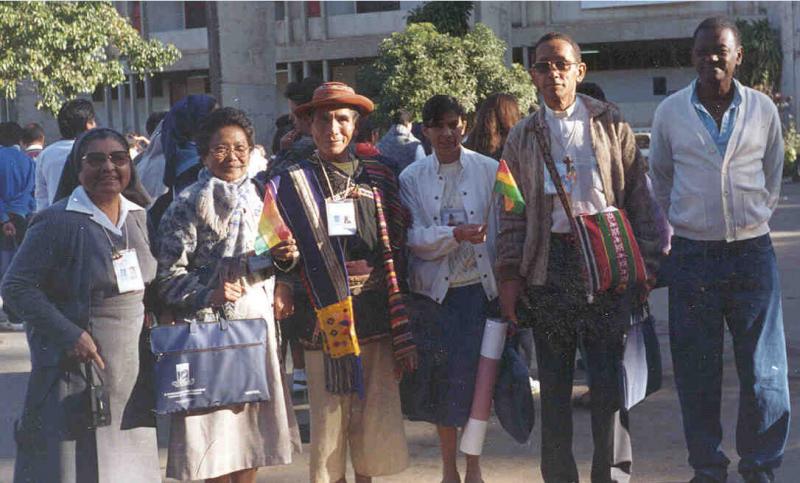
When One Person Reaches Out With Love
By Yevgeny Yevtushenko
Yevgeny Yevtushenko, one of the most loved Russian poets, tells us of a transforming moment. In 1944, Yevtushenko’ mother took him from Siberia to Moscow. They were among those who witnessed a procession of twenty thousand German war prisoners marching through the street of Moscow.
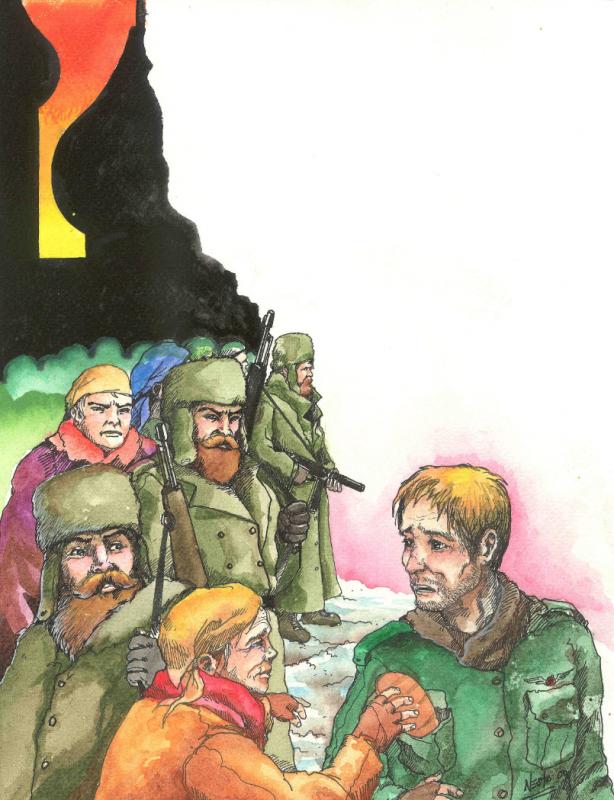
The pavement swarmed with onlookers, cordoned off by soldier and police. The crowd was mostly women – Russian women with hands roughened by hard work, lips untouched by lipstick and with thin, hunched shoulders which had borne half of the burden of war. Every one of them must have had a father or a husband, a brother or a son killed by the Germans.
They gazed with hatred in the direction from which the column was to appear at last we saw it. The Germans generals marched at the head, massive chins stuck out , lips folded disdainfully, their whole demeanor meant to show superiority over there plebeian victors. “They smell of eau-de-cologne, the bastards,” “Someone in the crowd said with hatred. The women were clenching their fists. The soldiers and policemen had all they could do to hold them back. All at once, something happened to them.
They saw the ordinary Germans boot soldiers, then unshaven, wearing dirty, bloodstained bandages, hobbling on crutches or leaning on the shoulders of her comrades; the soldiers walked with their heads down. The street became dead silent – the only sound was the shuffling of boots and the thumping of crutches. Then I saw an elderly woman in broken-down boots push herself forward and touch a policeman’s shoulder, saying: “Let me go through.”
There must have been something about her that made him step aside. She went up to the column, took from inside her coat something wrapped in a coloured handkerchief and unfolded it. It was a crust of black bread. She pushed it awkwardly into the pocket of a soldier, so exhausted that he was tottering on his feet. And now suddenly from every side women were running toward the soldiers, pushing into their hands bread, cigarettes, whatever they had.
The soldiers were no longer enemies. They were people.
(Orthodox Peace Fellowship)
Who Will Put Humpty Together Again?
By Gee-Gee O. Torres, assistant Editor
The devastation of Cambodia by Pol Pot is now legendary. But the Killing Fields were only part of his terror. On an ideological ‘trip’ he banished people from cities like Phnom Penh and closed down the school. Like Humpty Dumpty, the city and its institutions were shattered and lay in ruins. Into this educational wilderness have stepped some Filipino followers of Don Bosco to help Cambodia put the pieces together again. Our Assistant Editor visited them and shares with us what she saw. (Ed)
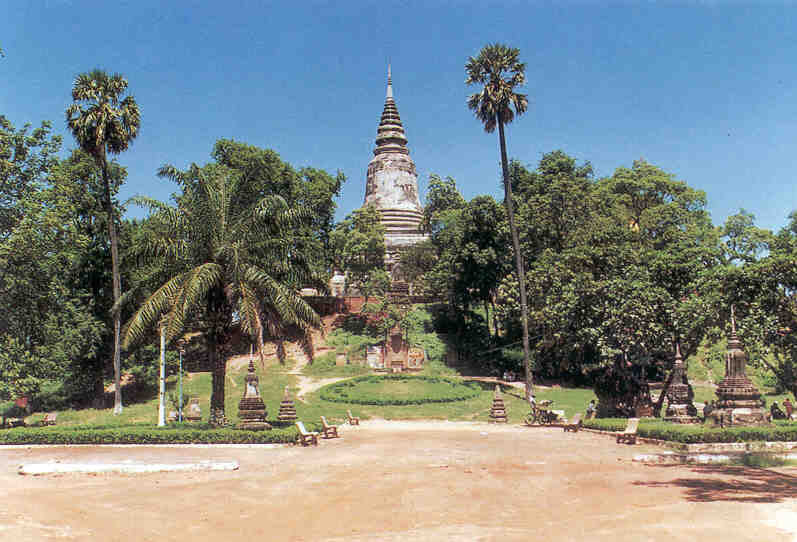
When I went to Cambodia last year to visit our Filipino missionaries, I met Sr. Len Montiel, a friend whom I had not seen for a long time after college graduation in Ateneo. Len joined the Maryknoll Sisters and is now assigned in Cambodia. She gives seminars on personal development to the youth. We went to see Youth Resource Development Center where she works and then she showed me around the city.
Since Phnom Penh is the capital city of Cambodia I was expecting to see Buddhist temples glittering gold, tall buildings, four-lane road with several levels of flyovers crisscrossing over it just like in Bangkok. But as we cruised along the narrow streets, riding at the back of a motorbike, I began to realize that Cambodia was not what I had expected. Blackened walls burnt out buildings, unmaintained roads, slum areas – that’s what I saw.
Sr. Len also brought me to the University of Royal Cambodge so I could have a glimpse of the educational situation in Cambodia. I was looking forward to seeing a university with well-maintained buildings, football fields, gymnasium and century old trees around the campus like in Ateneo. But again I was dismayed with what I saw- yes, I think, I saw century-old trees, but the buildings looked neglected, their canteen resembled a talipapa, the surroundings were untended. Then there was some sort of a pond at the back of the building. I asked Sr. Len, “What was a swimming pool?” “Oh yes. That was a swimming pool before. But during the time of Pol Pot, they turned that pool and the entire school into a pigpen because they said education is for pigs only.”
Every time I recall my visit to the University of Royal Cambodge I couldn’t help but think of the children in Cambodia. I wonder if they get to go to school and if they do, are they getting quality education? In the past 20 years – the Khmer Rouge regime of Polpot in 1975, the Vietnamese takeover in the 80’s, the fight between Hun Sen and Prince Norodom Shinouk and the coup d’etat in 1997- have devastated the county and has put education back a century. But children without proper education will never get out of the cycle of poverty. So a group of Salesian missionaries have taken up the challenge of living out in Cambodia the teaching of Don Bosco, IF you touch the hart of the youth, you can lead and guide them to do anything for their good.”
Lord, help us
There are six Filipino Salesian Sisters in Cambodia. They run the Don Bosco Vocational Training Center for Girls and Kindergarten School. They offer two-year courses on sewing, embroidery, computer secretarial and food & home management.
“In the school aside from skills training, we also give the students value formation activities,” said Sr. Malen. “For example, we start the class with a 15-minute good day talk where we discuss the theme for the month and for students who stay in the dormitory we end the day with a good night talk – a thought to sleep-by.” On Sunday the school is open to the youth and there are activities for the children, too.
Sr. Sarah finds their mission in Cambodia very relevant. “The Khmer people have been deprived of material things. Survival is the only thing that matters to them. But in survival also comes the need for value formation. Our students are mostly Pol Pot babies who had been through a terrible nightmare during the time of the Khmer Rouge that they trust nobody anymore. Students don’t even want to talk about their childhood experiences in the hands of Khmer Rouge. But I believe in time they will be able to leave behind the past and continue to dream. Sometimes it’s frustrating when I come in contact with poverty and misery; the situation seems to be so hopeless that I’d like to give up. So I always pray. “Lord, help me never to get used to what I see... said Sr. Sarah.
At times they also find their mission in Cambodia difficult – new land, new culture, new people, according to Sr. Beth. When I asked her how does she cope with this she answered, “I look back to the day of my perpetual now where I promised to stay where God wants me to stay and to be faithful to what I had asked for – to be missionary forever...”
Sr. Paz, on the other hand, is the person-in-charge of the kindergarten school. She enjoys her work especially when she hears mothers say, “We are learning form our children.” A mother told her one time that her child told her, “Mom, why is tit that when you do something for me, I say thank you, but when I do something for you, you don’t say thank you to me?”
Secret Haven
Now meet our food and Home Management expert, Sr. Teresa. I got the chance to see her secret haven when I was looking for a streamer and a big casserole to cook valenciana and embutido for our Pinoy missionaries get-together which we held t the Salesian sister’s House the day before I left Cambodia. Wow, the room was complete with different cooking gadgets. Had I discovered Sr. Teresa’s “territory earlier, I could have enjoyed cooking other Filipino dishes for them.
Finally we have Sr. Gertrudes, or Sr. Ched in short, who was formerly assigned in Myanmar. She was transferred to Cambodia last year to help Sr. Paz in their Kindergarten School and to teach English in their Vocational School.
If you’re on your way to Cambodia, don’t forget to drop-by and say hello to our Salesian Sisters! Their house is just five minutes away from Pochentong Airport. And, after visiting them, go directly to the other side of the city, look for the Don Bosco Technical School and surprise Br. Raddie, Fr. Oscar and Fr. Leo Ochoa, who was my tour guide two years ago when I want to visit our Pinoy missionaries in Thailand and who is now in Cambodia for his new mission assignment. They will be more than glad to see you.
Only Quality Printing
Bro. Raddie Lagaya, sdb was sent to Cambodia in 1995 to help in the Printing Press Department of their Don Bosco Technical in Phnom Penh where they offer courses on electronics, automotive, welding, mechanical, electrical and printing. He is now the head of their Printing Department.
When I visited him in their school, he showed me around the different departments. He also gave me a quick tour of the Printing Press and explained how the different machines work. Bro. Raddie is very particular about quality. He believes that the students will understand better what quality printing is when they see it. So the students are given hand-on training at the press.
Then I asked him, “What can you say about missionary life?” He said, “You need a lot of self-initiative to be a missionary. But to persevere and enjoy missionary life, you need a vocation.”
Agricultural by heart
Fr. Oscar Zamora, sdb who comes from Victorias, Negros was also in Cambodia during my visit. He brought me to see their technical school in Sihanoukville, 3-hours south of Phnom Penh. Fr. Walter Brigolin, in-charge of the school. Welcomed us and showed us the different buildings for their various technical courses. Many students would like to study in their school but out of the 180 participants, they can only accept 80.
Fr. Oscar told met that he had been assigned in Papua New Guinea (PNG) for nine years and was involved in teaching the people new techniques in agriculture. I asked him if he’s an agriculturist. He said, No, I am a Biology minor graduate. But as a biology student, I also studied subjects related to agriculture.” Is it true that here are cannibals in PNG?” I curiously asked. He said, “Nonsense. If there were I wouldn’t be here now, right?” With Fr. Oscar’s convincing answer, I think I would put PNG high on the list for our next Misyon trip.
The work of our Filipino Salesian Fathers, Brothers and Sisters may not be as dramatic and spectacular as working with landmine victims and AIDS patients. But in their own patient way, they are helping to put Cambodia together again.
“Lord, help me never to get used what I see...”